Why Antipsychotics Are Riskier Than You Think for Seniors with Dementia
Every year, thousands of elderly people with dementia are given antipsychotic drugs to calm agitation, aggression, or hallucinations. It seems like a quick fix - until a stroke happens. Or worse, until they don’t wake up. The truth is, these medications don’t just carry a risk. They double the chance of death and stroke in seniors with dementia. And yet, they’re still prescribed - often without full warning.
The U.S. Food and Drug Administration (FDA) put a black box warning on all antipsychotics back in 2005. That’s the strongest warning they can give. It says clearly: elderly patients with dementia who take these drugs have a 60% to 70% higher risk of dying. Stroke risk jumps by nearly 80%. These aren’t small numbers. They’re life-or-death.
How Antipsychotics Increase Stroke Risk
It’s not just one thing. Antipsychotics mess with your body in several dangerous ways. They can cause sudden drops in blood pressure when standing up - known as orthostatic hypotension. That makes seniors dizzy, weak, and more likely to fall. Falls lead to head injuries, which can trigger strokes.
They also trigger metabolic changes. Weight gain, high blood sugar, and abnormal cholesterol levels become common. These are all known stroke risk factors. Even more concerning, antipsychotics interfere with dopamine and serotonin in the brain - chemicals that help control blood flow to the brain. When those signals get scrambled, tiny blood vessels in the brain can clot or burst.
Studies show this risk isn’t just for people on these drugs for months. Even a few days of use can raise the chance of stroke. A 2012 study from the American Heart Association found that stroke risk spiked within weeks of starting antipsychotics. That means there’s no safe window. No "just trying it for a week" excuse.
Typical vs. Atypical Antipsychotics: Is One Safer?
You might hear doctors say, "We switched you to an atypical antipsychotic - it’s safer." But that’s misleading. Atypical antipsychotics (like risperidone, olanzapine, quetiapine) were marketed as better, gentler versions. But research doesn’t back that up when it comes to stroke risk.
A 2023 review in Neurology looked at five major studies. Four found that long-term use of typical antipsychotics (like haloperidol) carried a higher stroke risk than atypicals. But one study found no difference at all. And here’s the kicker: both types carry the same risk of death.
The American Journal of Epidemiology analyzed Medicare data from 2006 to 2010 and found that while atypicals cause more weight gain and diabetes, they don’t reduce stroke risk. In fact, stroke partially explains why typical antipsychotics kill more people - but not all of it. That means something else is going on, too.
Bottom line: Neither class is safe. If you’re told one is better, ask for the study. Chances are, it’s outdated or misinterpreted.
Who’s Most at Risk?
Not all seniors with dementia face the same danger. The highest risk is in:
- People over 80
- Those with existing heart disease, high blood pressure, or diabetes
- Patients with advanced dementia - especially those who can’t communicate pain or discomfort
- Residents of nursing homes, where antipsychotics are used as chemical restraints
One study of 32,710 Canadians found that stroke rates were identical between users of typical and atypical antipsychotics. Another study of 4,788 nursing home residents showed the same pattern. The drug class didn’t matter. The dementia did.
And here’s something many doctors don’t tell families: cognitive decline might not be just from dementia. It could be early signs of undetected strokes. That means when a person becomes more confused or withdrawn, it’s not just their disease getting worse - it could be their brain slowly dying from medication-induced blood flow problems.
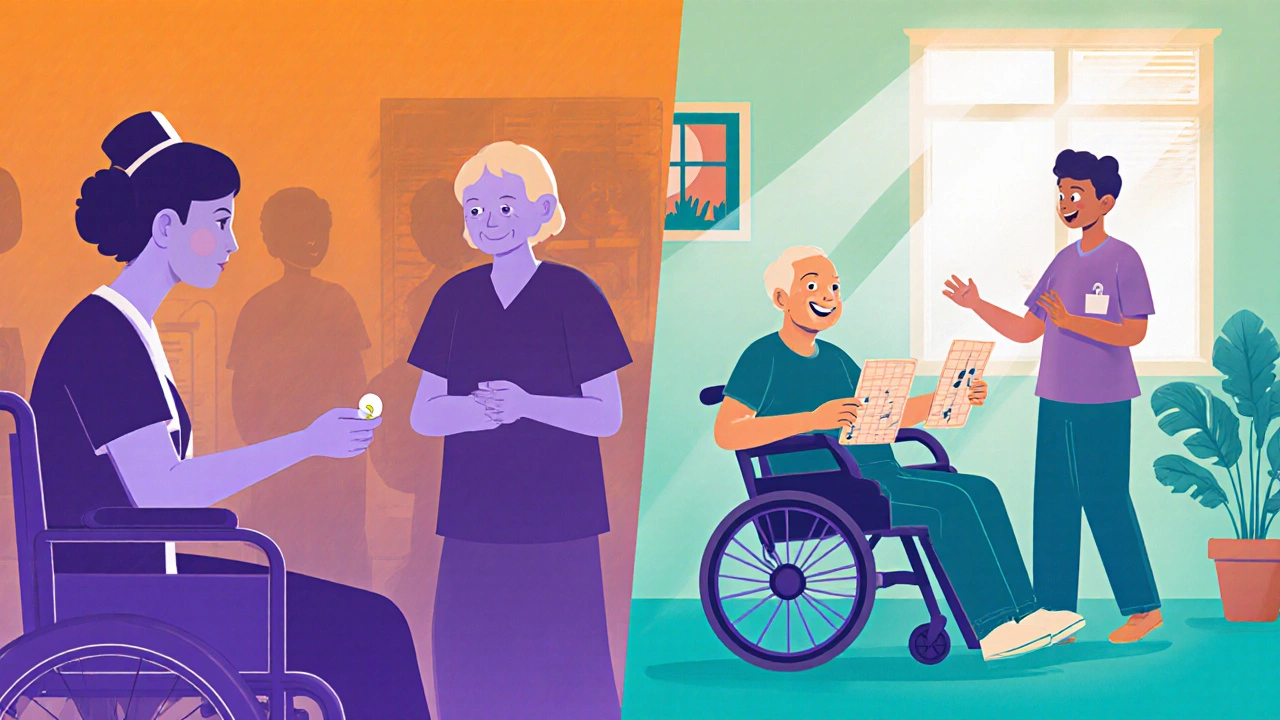
Why Are These Drugs Still Prescribed?
If the risks are so clear, why are antipsychotics still given out like candy in nursing homes?
Because caregivers are overwhelmed. Families are desperate. Staff are underpaid and understaffed. When a resident is yelling, hitting, or refusing to eat, it’s easier to give a pill than to sit with them, figure out what’s wrong, or change their environment.
It’s not malice. It’s exhaustion. But it’s still dangerous. The American Geriatrics Society’s Beers Criteria - the gold standard for safe prescribing in older adults - says outright: Do not use antipsychotics for behavioral symptoms of dementia. Not even once. Not even for a few days.
And yet, data shows that up to 30% of nursing home residents with dementia are still on these drugs. In some places, it’s higher. That’s not just outdated practice. It’s preventable harm.
What Should Be Done Instead?
There are better ways. Non-drug approaches work - and they’re safer.
- Environmental changes: Reduce noise, improve lighting, create quiet spaces. Overstimulation often triggers aggression.
- Structured routines: People with dementia feel safer with predictability. Same meals, same walks, same caregivers.
- Person-centered care: What’s the person trying to say? Pain? Fear? Loneliness? A 2021 study showed that when staff were trained to interpret behaviors as communication, antipsychotic use dropped by 40% in six months.
- Music and art therapy: Calms agitation without drugs. Proven in multiple trials.
- Physical activity: Even short daily walks reduce restlessness and improve sleep.
Some families worry: "But what if they’re violent?" The answer is not a pill. It’s a team. A geriatric psychiatrist, a behavioral therapist, an occupational therapist - working together. It takes time. But it saves lives.
The Real Cost of a Prescription
Think about this: if a senior takes an antipsychotic for three months, their risk of stroke goes up by 80%. Their risk of death goes up by 65%. That’s not treatment. That’s gambling with their life.
And here’s the worst part - no one tells you. Families are often handed a script without being warned. They’re told, "It’s just to help them sleep" or "It’ll calm them down." But no one says: "This could kill them."
Doctors aren’t always to blame. Many aren’t trained in geriatric psychiatry. They rely on old habits. But that doesn’t make it right.
If your loved one has dementia and is on an antipsychotic, ask: "Why?" Ask: "What are the alternatives?" Ask: "What happens if we stop this?" And if the answer is "We’ve tried everything else," push harder. Because you haven’t.
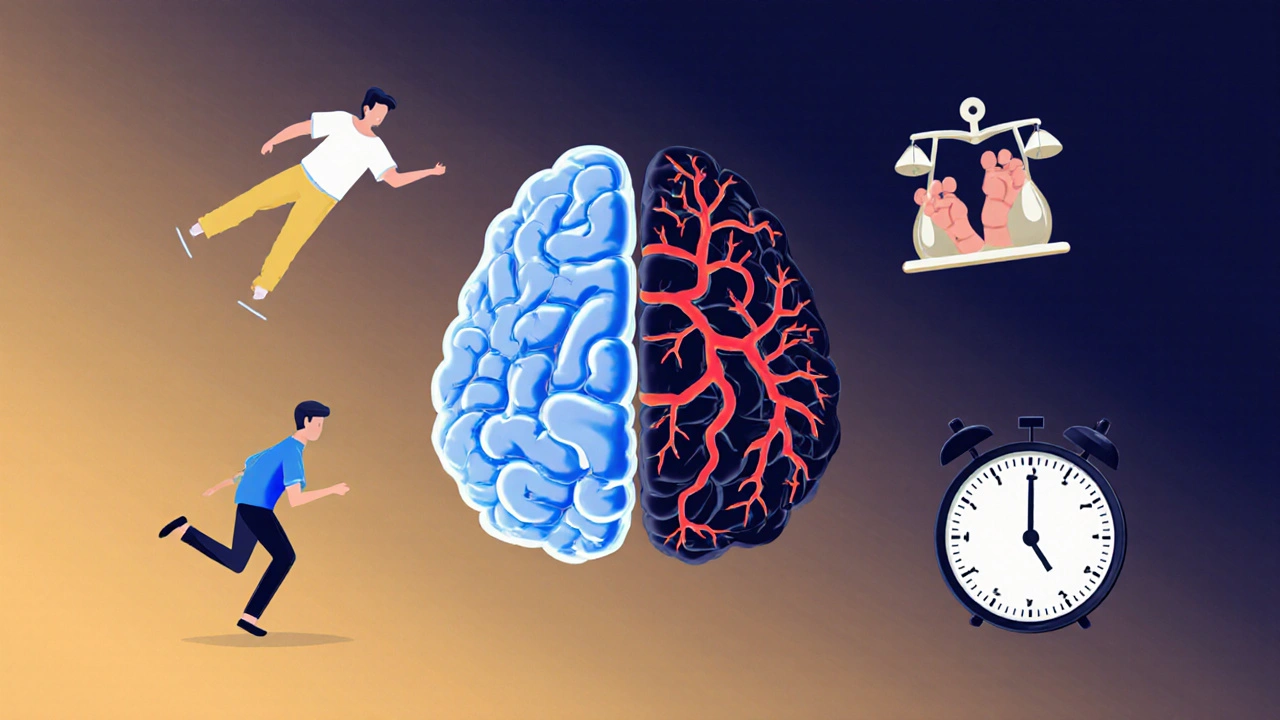
What to Do Right Now
If you’re caring for someone with dementia who’s on an antipsychotic, here’s what to do:
- Request a full medication review with their doctor - including all prescriptions and supplements.
- Ask if the drug was prescribed for dementia-related behavior. If yes, ask for a plan to taper it off - slowly, under supervision.
- Document all behavioral changes before and after stopping. Use a journal. Note time of day, triggers, duration.
- Request a referral to a geriatric psychiatrist or dementia specialist. Not a general practitioner.
- Join a support group. Other families have been here. They know what works.
Don’t stop cold turkey. That can cause withdrawal seizures or worsen symptoms. But don’t stay on it indefinitely. The goal isn’t to eliminate all behavior - it’s to manage it safely.
Final Thought: It’s Not About Control. It’s About Care.
Antipsychotics don’t cure dementia. They don’t fix the brain. They just silence the person. And in doing so, they steal their last years of dignity.
The real solution isn’t more pills. It’s more time. More training. More compassion. We can do better. We have to.
Are antipsychotics ever safe for seniors with dementia?
No, they are not considered safe. Major guidelines, including the American Geriatrics Society’s Beers Criteria, recommend avoiding antipsychotics entirely for behavioral symptoms of dementia. Even short-term use increases stroke and death risk. They should only be considered in rare cases - like extreme aggression that threatens safety - and only after all non-drug options have failed and under close supervision.
Can antipsychotics cause dementia to get worse?
Yes. Antipsychotics can accelerate cognitive decline. They block dopamine, a chemical needed for memory and thinking. Studies show seniors on these drugs lose mental function faster than those not taking them. This isn’t just a side effect - it’s a direct impact on brain health.
What are the signs an antipsychotic is causing harm?
Watch for sudden dizziness, falls, confusion, slurred speech, weakness on one side of the body, or extreme sleepiness. These could signal a stroke. Other signs include weight gain, dry mouth, constipation, or tremors. If any of these appear after starting the drug, contact a doctor immediately.
Is there a legal issue if antipsychotics are used without consent?
Yes. In many countries, including Australia and the U.S., using antipsychotics in dementia patients without informed consent from a legal representative can be considered a violation of patient rights. In nursing homes, using these drugs as chemical restraints - to make residents easier to manage - is illegal in most jurisdictions. Families have the right to refuse and request alternatives.
How long does it take for antipsychotics to leave the body?
It depends on the drug. Typical antipsychotics like haloperidol can take days to weeks to fully clear. Atypicals like risperidone or quetiapine may take up to two weeks. But even after the drug leaves the system, the damage - like a stroke or brain injury - may be permanent. That’s why tapering slowly under medical supervision is critical.
Are there any natural alternatives to antipsychotics for dementia behavior?
Yes. Music therapy, sunlight exposure, pet therapy, massage, and structured daily routines have all been shown to reduce agitation and aggression in multiple clinical trials. A 2020 study in The Lancet found that personalized music playlists reduced behavioral symptoms as effectively as antipsychotics - without the risks. These approaches require more time and staff training, but they’re proven and safe.
Next Steps for Families and Caregivers
If you’re reading this because someone you love is on an antipsychotic, start here:
- Get a copy of their full medication list.
- Write down every behavioral issue you’ve seen - when it happens, how long it lasts, what seems to trigger it.
- Ask the doctor: "Is this drug being used for dementia-related behavior?" If yes, ask for a tapering plan.
- Request a consultation with a dementia specialist or geriatric psychiatrist.
- Join a local dementia caregiver group. You’re not alone.
There’s no rush. But there’s no time to waste, either. Every day on these drugs is another day of increased risk. You have the power to ask for better. And you owe it to them to try.

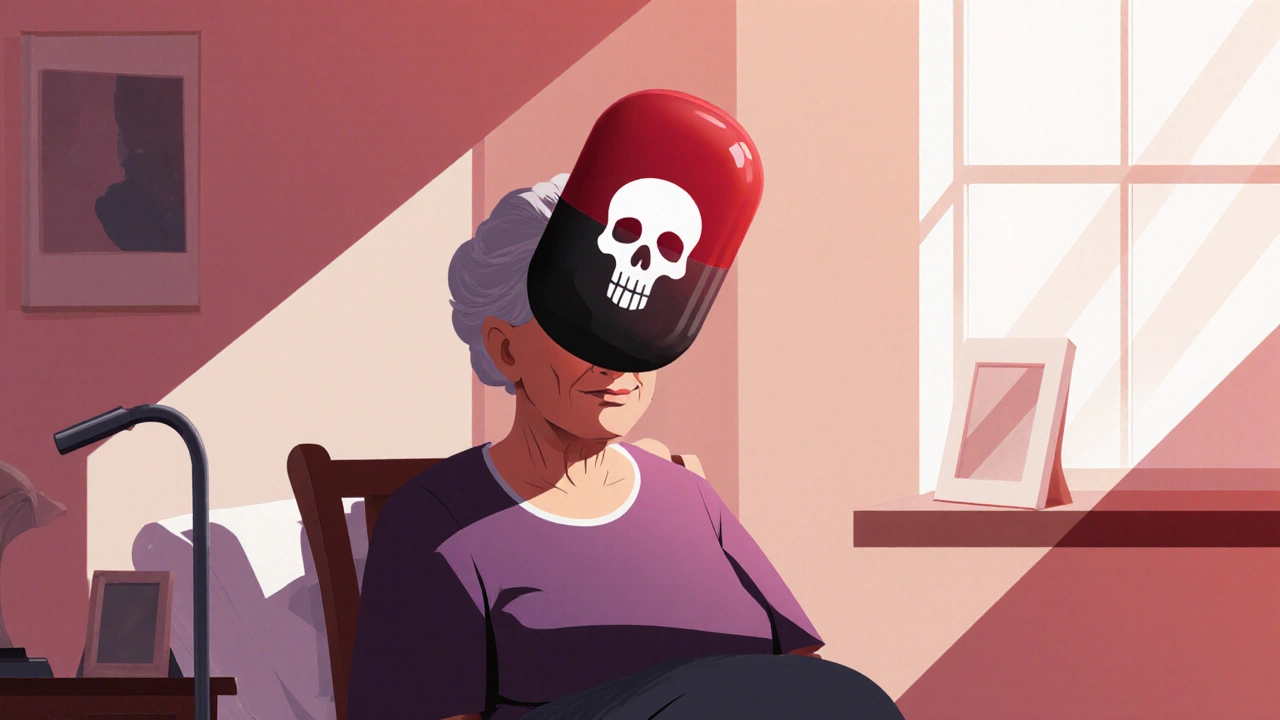
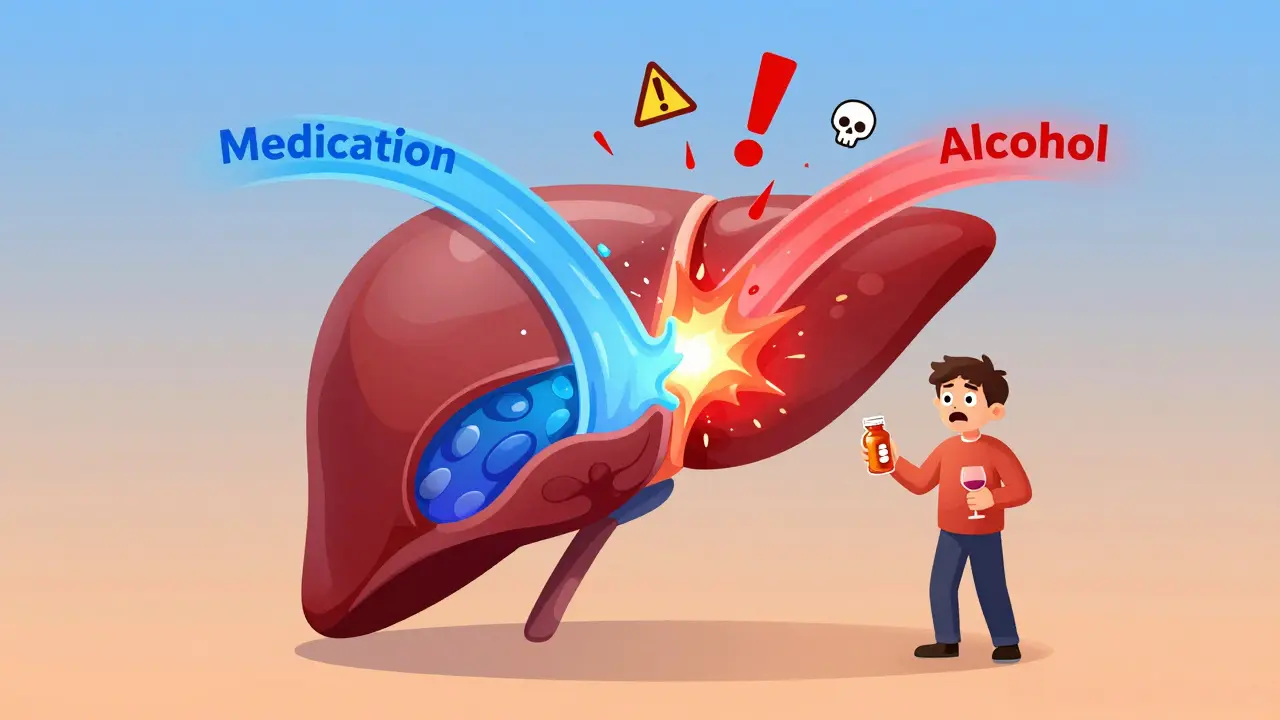

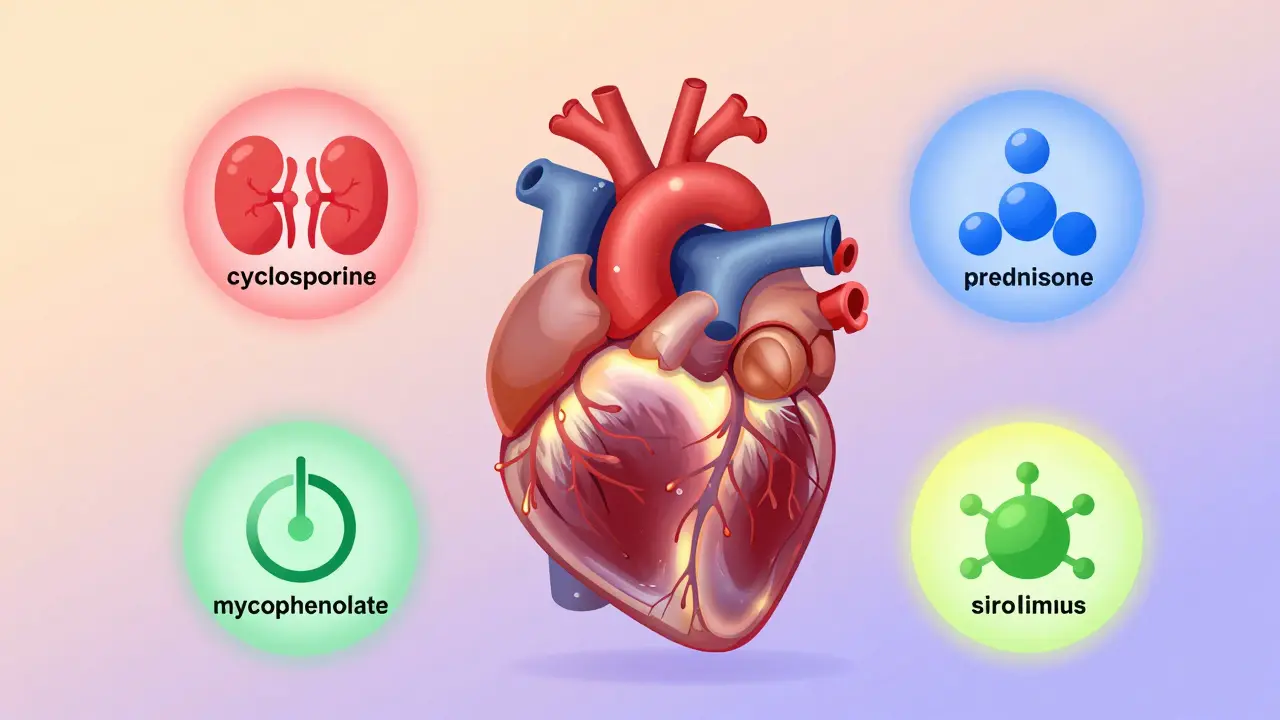


Mark Kahn on 21 November 2025, AT 06:07 AM
Hey everyone, just wanted to say this post hit hard. My grandma was on one of these meds for months and we didn’t know the risks. She started stumbling more, getting super sleepy, and we thought it was just dementia getting worse. Turns out it was the drug. We got her off it slowly and she smiled again. Not a miracle, but a human. Thank you for putting this out there.